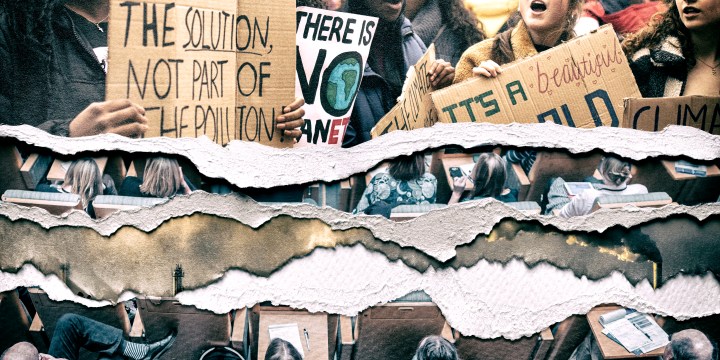SUSTAINABLE TRANSITION OP-ED
How universities can play a central role in fostering a transformative approach to climate change

The recently released IPCC report warns that we have little time left to make a difference on climate change. Universities can be leaders in society’s efforts in this regard. It’s a matter of recognising their responsibilities and choosing the right priorities.
The report of the International Panel on Climate Change warns that profound change is needed to restrict global warming to the predicted increase of 1.50C above pre-industrial levels over the next two decades. To prevent further warming by 2100, the report argues, this change must be transformational.
Concerted effort from multiple stakeholders across the public and private sectors, civil society and academia are needed to address the climate emergency. The IPCC has previously described transformational change as “rapid and far-reaching transitions in energy, land, urban and infrastructure (including transport and buildings), and industrial systems”. The report released on 28 February 2022 outlines options for adaptation to climate change.
Wits Vice-Chancellor and Principal, Professor Zeblon Vilakazi, argues that the climate crisis is an emergency that should be prioritised by individuals, cities, governments, corporates, civil society, the media and universities. Universities have a particularly significant role to play in achieving sustainable outcomes that benefit everyone, he says.
The Talloires Declaration (1990) — the first official statement made by university leaders of a commitment to environmental sustainability in higher education — recognises this responsibility.
So, how can universities effect transformational change?
First, universities can contribute to the transformational change needed to address the climate emergency by prioritising sustainability and climate change through inter-, trans-, and multidisciplinary research that among other factors highlights the interlinked challenges of climate change, sustainability and inequality.
They can contribute through empowering students, staff and individuals to tackle the climate emergency; and through innovation and social leadership from the perspective of the Global South.
One such example is a student solar energy project that has been transformed into a cost-effective, modular-based solar energy kit that reduces e-waste, and which can be used in unserviced and under-serviced communities in South Africa. It is now linking up with another student project that is bridging the digital divide through developing low-cost, long-range free-space optics that can connect informal settlement communities to high-speed internet in local communities.
We can also use our universities to develop the high-level skills required to train talent in adequate measure, and to develop critical thinkers who are cognisant of the effects of climate change and who can tackle the emergency with fervour in their respective fields. We can produce conscientious graduates who can transform society through their active citizenship and social leadership. In 2022, Wits launched a three-week Gateway to Success programme for first-year students which included a compulsory credit-bearing module on tackling climate change, thus embedding this emergency into the academic programme from the first year of study.
Another option for universities is to reimagine their physical and digital infrastructure to reduce their own environmental impact, for example, through adopting energy-efficient strategies and promoting renewable energy projects. This could include rooftop solar PV installations; green buildings; optimised building management systems; indoor lighting retrofits; sustainable hot-water systems for residences; water, stormwater and wastewater assessments; food security; transport systems; green procurement policies; and effective land and waste management systems.
Finally, universities are important sites for piloting innovations to address climate change and thereby to demonstrate the efficacy and scaling up of such innovations. This includes demonstrating, for example, the potential for mining activities to be undertaken in a sustainable manner.
In this, its centennial year, Wits is adopting a holistic approach that acknowledges the complex nature of the climate emergency, and its connections to the structure of society and the economy.
We are bringing together our significant expertise in climate modelling, climate mitigation and adaptation, sustainable mining, energy and the economic and social elements of a just transition and inequality, among other aspects. We will harness this expertise to ensure that climate, sustainability and inequality challenges in South Africa and across the globe are addressed.
The creation of the new position of Pro-Vice-Chancellor for Climate, Sustainability and Inequality is testimony to the university’s commitment that this issue will be tackled at the highest levels of the university’s administration.
The inclusion of three concepts in the portfolio — climate, sustainability and inequality — is indicative of a holistic approach. Climate will be a key focus of this portfolio, which will aim to support existing climate research and to increase collaborative research across schools and faculties, with other universities and across the public and private sectors.
Globally, climate policy has traditionally focused on mitigation (reduction of greenhouse gases), with less emphasis on adaptation measures or compensation for loss and damages from climate impacts. Mitigation remains important as we must limit greenhouse gas emissions, but we also need to be realistic about the impacts of climate change and plan for adaptation and for compensation for loss and damages. This is important for South Africa due to our vulnerability to climate impacts. A recent report by Wits’ Global Change Institute explains that average temperature increases in the interior of southern Africa are almost twice the global average.
Sustainability is important because it encompasses broader environmental and social issues. These broader issues of sustainability (such as water pollution and biodiversity loss) affect the health of humans, animals and ecosystems and will exacerbate the effects of climate change on water and food security. Society and the economy cannot exist outside of the environment, and we must acknowledge that humans are part of nature. Critical social issues cannot be separated from environmental issues.
Sustainability includes “safeguarding long-term ecological sustainability, satisfying basic needs, and promoting intragenerational and intergenerational equity”.
Linked to social sustainability is inequality. There is inequality in the responsibility for emissions at both an international and national scale. Industrialised countries have historically contributed a disproportionate amount to cumulative greenhouse gas emissions. However, South Africa is one of the largest greenhouse gas emitters in the world today, largely due to our reliance on coal for electricity generation.
Research by Huang and Tian found that South Africa had the highest inequality in carbon emissions among the highest-emitting developing countries. The research indicated that top income earners are responsible for greater emissions than the rest of the population. There is also inequality in vulnerability to climate impacts, and in the adaptive capacity to respond to climate change and implement climate policy.
Last, a just transition is required to achieve sustainability and climate resilience, but if the transition happens without addressing inequality, there will also be inequality in transition impacts. An unjust transition is not an option for South Africa. A green cross is urgently needed to halt the climate emergency — we have no choice but to act now. OBP/DM




















 Become an Insider
Become an Insider
Comments - Please login in order to comment.